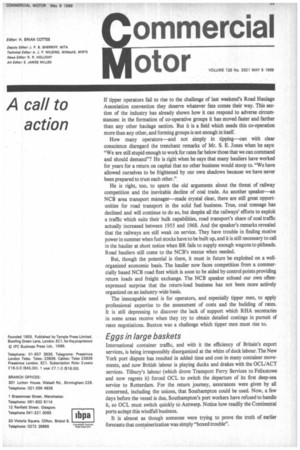ommercial otor
Page 25

If you've noticed an error in this article please click here to report it so we can fix it.
If tipper operators fail to rise to the challenge of last weekend's Road Haulage Association convention they deserve whatever fate comes their way. This section of the industry has already shown how it can respond to adverse circumstances: in the formation of co-operative groups it has moved faster and farther than any other haulage section. But it is a field which needs this co-operation more than any other, and forming groups is not enough in itself.
How many operators—and not simply in tipping—can with clear conscience disregard the trenchant remarks of Mr. S. E. Jones when he says: "We are still stupid enough to work for rates far below those that we can command and should demand"? He is right when he says that many hauliers have worked for years for a return on capital that no other business would stoop to. "We have allowed ourselves to be frightened by our own shadows because we have never been prepared to trust each other."
He is right, too, to spurn the old arguments about the threat of railway competition and the inevitable decline of coal trade. As another speaker—an NCB area transport manager—made crystal clear, there are still great opport unities for road transport in the solid fuel business. True, coal tonnage has declined and will continue to do so, but despite all the railways' efforts to exploit a traffic which suits their bulk capabilities, road transport's share of coal traffic actually increased between 1955 and 1968. And the speaker's remarks revealed that the railways are still weak on service. They have trouble in finding motive power in summer when fuel stocks have to be built up, and it is still necessary to call in the haulier at short notice when BR fails to supply enough wagons to pitheads. Road hauliers still come to the NCB's rescue when needed.
But, though the potential is there, it must in future be exploited on a wellorganized economic basis. The haulier now faces competition from a commer cially based NCB road fleet which is soon to be aided by control points providing return loads and freight exchange. The NCB speaker echoed our own oftenexpressed surprise that the return-load business has not been more actively organized on an industry-wide basis.
The inescapable need is for operators, and especially tipper men, to apply professional expertise to the assessment of costs and the building of rates.
It is still depressing to discover the lack of support which RHA secretaries in some areas receive when they try to obtain detailed costings in pursuit of rates negotiations. Buxton was a challenge which tipper men must rise to.
Eggs in large baskets
International container traffic, and with it the efficiency of Britain's export services, is being irresponsibly disorganized at the whim of dock labour. The New York port dispute has resulted in added time and cost in many container movements, and now British labour is playing ducks and drakes with the OCL/ACT services. Tilbury's labour (which drove Transport Ferry Services to Felixstowe and now regrets it) forced OCL to switch the departure of its first deep-sea service to Rotterdam. For the return journey, assurances were given by all concerned, including the unions, that Southampton could be used. Now, a few days before the vessel is due, Southampton's port workers have refused to handle it, so OCL must switch quickly to Antwerp. Notice how readily the Continental ports accept this windfall business.
It is almost as though someone were trying to prove the truth of earlier forecasts that containerization was simply "boxed trouble".


















































































































